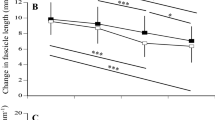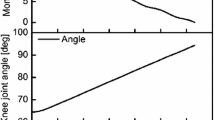Abstract
The present study aimed to examine the influences of tendon stiffness, joint stiffness, and electromyographic activity on jump performances consisting of a single-joint movement. Twenty-four men performed three kinds of unilateral maximal jump using only the ankle joint (squat jump: SJ; countermovement jump: CMJ; drop jump: DJ) on the sledge apparatus. The relative differences in the jump height of CMJ and DJ compared to SJ were defined as pre-stretch augmentation. During jumping exercises, electromyographic activities (mEMG) were recorded from the plantar flexors. Ankle joint stiffness was calculated as the change in the joint torque divided by the change in ankle joint angle during the eccentric phase of DJ. Achilles tendon stiffness was measured using ultrasonography during isometric plantar flexion. No significant correlations were found between joint stiffness and pre-stretch augmentation in both CMJ and DJ. On the contrary, tendon stiffness was significantly correlated with pre-stretch augmentation in both CMJ (r = −0.471) and DJ (r = −0.502). The relative mEMG value of CMJ (to that of SJ) during the concentric phase was significantly correlated with pre-stretch augmentation (r = 0.481), although this relationship was not found in DJ. These results suggested that (1) the greater jump height in CMJ could be explained by both the tendon elasticity and the increased activation level of muscle, (2) tendon elasticity played a more significant role in the enhancement of jump height during DJ, and (3) joint stiffness was not related to either pre-stretch augmentation or tendon stiffness.






Similar content being viewed by others
References
Alexander RM, Bennet-Clark HC (1977) Storage of elastic strain energy in muscle and other tissue. Nature 265:114–117
Arampatzis A, Bruggemann GP, Metzler V (1999) The effect of speed on leg stiffness and joint kinetics in human running. J Biomech 32:1349–1353
Arampatzis A, Schade F, Walsh M, Bruggemann GP (2001) Influence of leg stiffness abd its effect on myodynamic jumping performance. J Electromyogr Kinesiol 11:355–364
Asmussen E, Bonde-Peterson F (1974) Storage of elastic energy in skeletal muscle in man. Acta Physiol Scand 91:385–392
Beker D, Nanse S, Noore M (2001) The load that maximizes the average mechanical power output during jump squats in power-trained athletes. J Strength Cond Res 15:92–97
Bobbert MF (2001) Dependence of human squat jump performance on the series elastic compliance of the triceps surae: a simulation study. J Exp Biol 204:533–542
Bobbert MF, Casius LJR (2005) Is the effect of a countermovement on jump height due to active state development? Med Sci Sports Exerc 37:440–446
Bobbert MF, Gerritsen KGM, Litjens MCA, VanSoest AJ (1996) Why is countermovement jump height greater than squat jump height? Med Sci Sports Exerc 28:1402–1412
Bojsen-Moller J, Magnusson SP, Rasmussen LR, Kjaer M, Aagaard P (2005) Muscle performance during maximal isometric and dynamic contractions is influenced by the stiffness of the tendinous structures. J Appl Physiol 99:986–994
Bosco C, Tarkka I, Komi PV (1982) Effect of elastic energy and myoelectrical potentiation of triceps surae during stretch-shortening cycle exercise. Int J Sports Med 3:137–140
Cavagna GA, Dusman B, Margaria R (1968) Positive work done by a previously stretched muscle. J Appl Physiol 24:21–32
Chelly SM, Denis C (2001) Leg power and hopping stiffness: relationship with sprint running performance. Med Sci Sports Exerc 33:326–333
Edman KAP, Elzinga G, Noble MIM (1978) Enhancement of mechanical performance by stretch during titanic contractions of vertebrate skeletal muscle fibers. J Physiol 281:139–155
Farley CT, Morgenroth DC (1999) Leg stiffness primarily depends on ankle stiffness during human hopping. J Biomech 32:267–273
Finni T, Ikegawa S, Lepola V, Komi PV (2003) Comparison of force–velocity relationships of vastus lateralis muscle in isokinetic and in stretch-shortening cycle exercises. Acta Physiol Scand 177:483–491
Fukunaga T, Kubo K, Kawakami Y, Fukashiro S, Kanehisa H, Maganaris CN (2001) In vivo behavior of human muscle tendon during walking. Proc R Soc Lond B 268:229–233
Heise GD, Martin PE (1998) “Leg spring” characteristics and the aerobic demand of running. Med Sci Sports Exerc 30:750–754
Hof AL, Vanzandwijk JP, Bobbert MF (2002) Mechanics of human triceps surae muscle in walking, running and jumping. Acta Physiol Scand 174:17–30
Kawakami Y, Muraoka T, Ito S, Kanehisa H, Fukunaga T (2002) In vivo muscle fibre behaviour during conter-movement exercise in humans reveals a significant role for tendon elasticity. J Physiol 540:635–646
Kilani HA, Palmer SS, Adrian MJ, Gapsis J (1989) Block of the stretch reflex of vastus lateralis during vertical jumps. Hum Mov Sci 8:247–269
Kubo K (2005) In vivo elastic properties of human tendon structures in lower limb. Int J Sports Health Sci 3:143–151
Kubo K, Kawakami Y, Fukunaga T (1999) Influence of elastic properties of tendon structures on jump performance in humans. J Appl Physiol 87:2090–2096
Kubo K, Kanehisa H, Kawakami Y, Fukunaga T (2000a) Elasticity of tendon structures of lower limbs in sprinters. Acta Physiol Scand 168:327–335
Kubo K, Kanehisa H, Takeshita D, Kawakami Y, Fukashiro S, Fukunaga T (2000b) In vivo dynamics of human medial gastrocnemius muscle-tendon complex during stretch-shortening cycle exercise. Acta Physiol Scand 170:127–135
Kubo K, Kanehisa H, Kawakami Y, Fukunaga T (2002) Measurement of viscoelastic properties of tendon structures in vivo. Scand J Med Sci Sports 12:3–8
Kubo K, Kanehisa H, Fukunaga T (2005a) Comparison of elasticity of human tendon and aponeurosis in knee extensors and ankle plantar flexors in vivo. J Appl Biomech 21:129–142
Kubo K, Kanehisa H, Fukunaga T (2005b) Influences of repetitive drop-jump and isometric leg press exercises on the tendon properties in knee extensors. J Strength Cond Res 19:864–870
Kuitunen S, Avela J, Kyrolainen H, Nicol C, Komi PV (2002a) Acute and prolonged reduction in joint stiffness in humans after exhausting stretch-shortening cycle exercise. Eur J Appl Physiol 88:107–116
Kuitunen S, Komi PV, Kyrolainen H (2002b) Knee and ankle joint stiffness in sprint running. Med Sci Sports Exerc 34:166–173
Maganaris CN, Baltzopoulos V, Sargeant AJ (1998) Changes in Achilles tendon moment arm from rest to maximal isometric plantarflexion: in vivo observations in man. J Physiol 510:977–985
Magnusson SP, Aagaard P, Rosager S, Poulsen PD, Kjaer M (2001) Load-displacement properties of the human triceps surae aponeurosis in vivo. J Physiol 531:277–288
Mero A, Komi PV (1986) Force-, EMG, and elasticity-velocity relationships at submaximal, maximal and supramaximal running speeds in sprinters. Eur J Appl Physiol 55:553–561
Muramatsu T, Muraoka T, Takeshita D, Kawakami Y, Hirano Y, Fukunaga T (2001) Mechanical properties of tendon and aponeurosis of human gastrocnemius muscle in vivo. J Appl Physiol 90:1671–1678
Muraoka T, Muramatsu T, Fukunaga T, Kanehisa H (2005) Elastic properties of human Achilles tendon are correlated to muscle strength. J Appl Physiol 99:665–669
Stone MH, O’Bryant HS, McCoy L, Coglianese R, Lehmkuhl M, Schilling B (2003) Power and maximum strength relationships during performance of dynamic and static weighted jumps. J Strength Cond Res 17:140–147
Svantesson U, Grimby G (1995) Stretch-shortening cycle during plantar flexion in young and elderly women and men. Eur J Appl Physiol 71:381–385
Author information
Authors and Affiliations
Corresponding author
Rights and permissions
About this article
Cite this article
Kubo, K., Morimoto, M., Komuro, T. et al. Influences of tendon stiffness, joint stiffness, and electromyographic activity on jump performances using single joint. Eur J Appl Physiol 99, 235–243 (2007). https://doi.org/10.1007/s00421-006-0338-y
Accepted:
Published:
Issue Date:
DOI: https://doi.org/10.1007/s00421-006-0338-y




